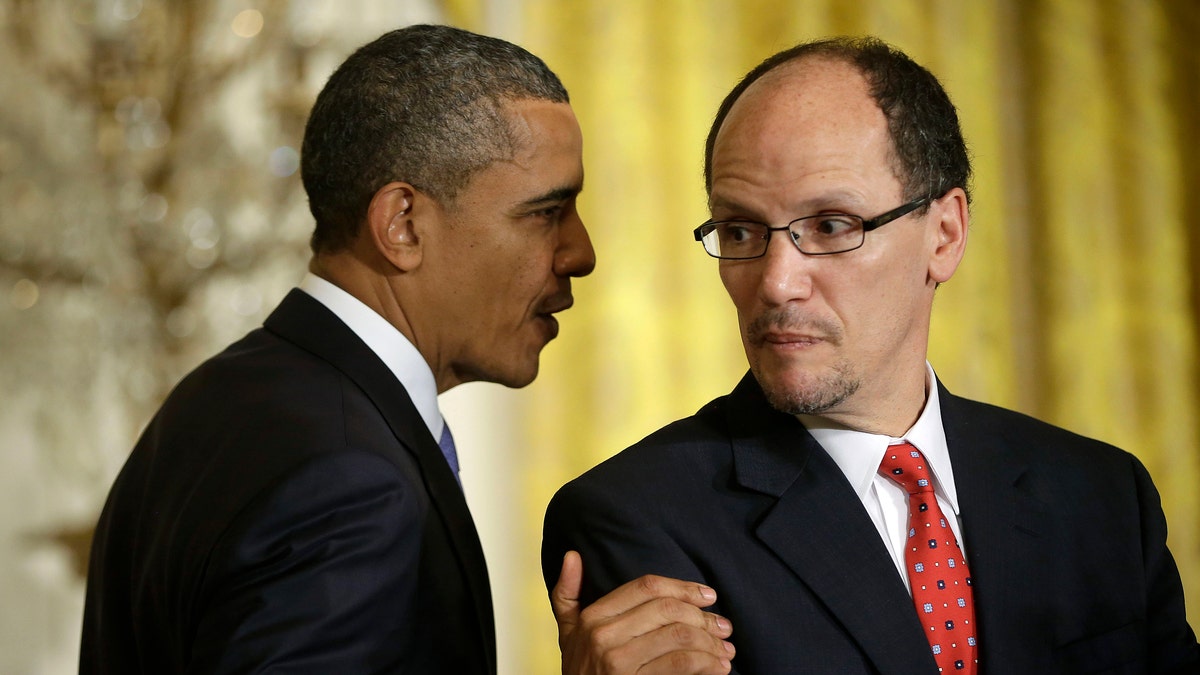
President Barack Obama talks with his nominee for Labor Secretary, Thomas E. Perez, during an announcement, Monday, March 18, 2013, in the East Room of the White House in Washington. (AP Photo/Pablo Martinez Monsivais)
Labor secretary nominee Thomas Perez cut a "secret deal behind closed doors" with leaders of a Minnesota city, persuading them to drop a contentious lawsuit in exchange for the Justice Department staying out of whistleblower cases brought against the city, according to a congressional Republican report.
The "quid pro quo," according to the report, potentially cost taxpayers as much as $200 million.
The allegations are highly unusual, though are already being disputed by congressional Democrats. Perez is not a favorite of congressional Republicans, and the charges could impact his pending confirmation hearing -- scheduled for this Thursday.
The report, obtained in advance by Fox News, claimed Perez in February 2012 "manipulated" federal law as assistant attorney general and "pushed the limits of justice to make this deal happen."
Both cases involved the city of St. Paul. The 67-page report states that the Justice Department's decision to opt out of the whistleblower cases potentially cost taxpayers as much as $200 million -- the amount the government could have won had it pursued damages in the case.
But, according to the report, the Justice Department stayed away from that case in order to get the city to drop an appeal to the Supreme Court on another matter. The department was allegedly concerned that the high court, in the course of reviewing that case, would strike down a major element of civil rights enforcement.
"Perez simply could not allow the Court to rule," the report said. "Perez sought leverage to stop the city from pressing its appeal."
The case the Justice Department was allegedly concerned about was St. Paul's appeal to the Supreme Court, on a case in which property owners said the city made extraordinary efforts, through strict code enforcement, to condemn their properties.
The owners said reducing the amount of affordable housing for minorities violated the federal Fair Housing Act -- by what is known as "disparate impact."
Perez appeared to think the Supreme Court overturning the case would have been a severe blow to civil rights enforcement, the report concluded.
The "disparate impact" provision, which the report described as legally questionable, prohibits housing policies that end up discriminating against certain groups even if those policies are not blatantly discriminatory.
"Perez sought, facilitated, and consummated this deal because he feared that the Court would find disparate impact unsupported by the text of the Fair Housing Act," the report said.
The other end of the alleged deal was for the Justice Department not to get involved in cases against the city of St. Paul that alleged the city received millions in Department of Housing and Urban Development funds -- including stimulus money -- but failed to file the requisite paperwork regarding the hiring of low-income workers.
In that case, which also involved the city of Minneapolis, plaintiff Thomas Newell got neither the backing of the agency nor the Justice Department and lost the case, which if won would likely have resulted in the cities repaying tens of millions in damages.
The Obama administration has acknowledged that senior Justice Department attorneys recommended intervening in the case and characterized the False Claims Act infractions reported by Newell as "particularly egregious."
However, they thought the case would be "quite weak and never should have been a serious candidate for intervention," according to the report.
The Justice Department claims everything was above board -- and that the department held three staff briefings, heard 24 hours of additional testimony and reviewed 1,400 pages of documents before deciding not to intervene.
"The litigation decisions made by the department were in the best interests of the United States and were consistent with the department's legal, ethical, and professional responsibility obligations," the department said in a statement.
Former Justice Department spokeswoman Tracy Schmaler also questioned the use of the term "quid pro quo" to describe what happened.
"It's such a loaded term," she said. "I think in fact you have almost everybody agreeing nothing inappropriate happened."
The report -- subtitled "How Assistant Attorney General Thomas Perez manipulated Justice and Ignored Rule of Law" -- was a joint effort by minority leaders of the Senate Judiciary Committee and the Republican-led House's Judiciary and Oversight and Government Reform committees.
"The facts surrounding this quid pro quo show that Perez may have exceeded the scope of the ethics and professional-responsibility opinions he received from the department and thereby violated his duties of loyalty and confidentiality to the United States. Perez also misled senior Justice Department officials about the quid pro quo," the report states.
But congressional Democrats put out a statement and memo of their own late Sunday refuting the details.
The statement said the "overwhelming evidence" indicates Perez and others "acted professionally to advance the interests of civil rights and effectively combat the scourge of discrimination in housing." They said the decision not to intervene in the suit against St. Paul was based on expert recommendations.
"Instead of identifying inappropriate conduct by Mr. Perez, it appears that the accusations against him are part of a broader political campaign to undermine the legal safeguards against discrimination that Mr. Perez was protecting," they said.




